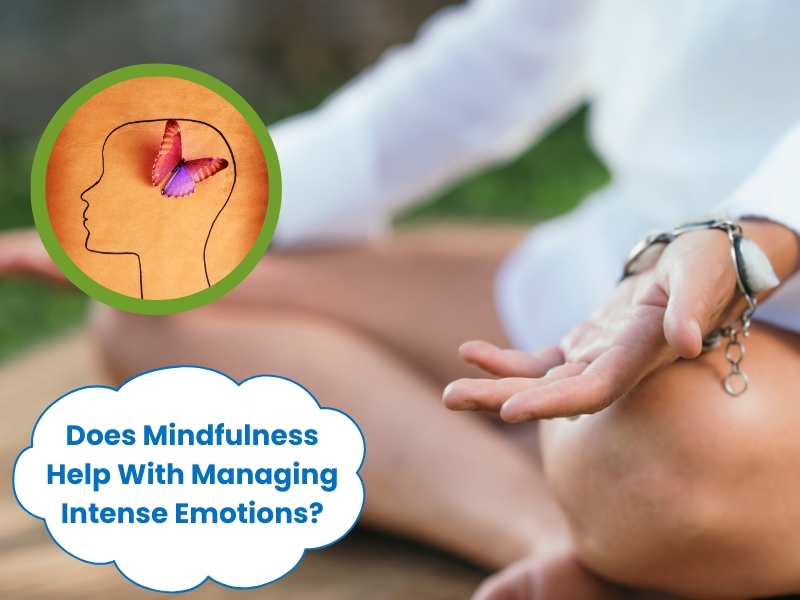Managing intense emotions can be challenging, especially for individuals dealing with various mental health or emotional difficulties. Thankfully, mindfulness has emerged as a powerful tool for helping people manage mindfulness emotions. By focusing on the present moment, mindfulness helps individuals acknowledge their feelings without becoming overwhelmed by them. This article explores the connection between mindfulness and emotional well-being, focusing on how mindfulness techniques can help manage intense emotions, improve emotional responses, and bring long-term benefits to those seeking emotional balance.
What is mindfulness, and how does it relate to emotional well-being?
Mindfulness is the practice of focusing on the present moment with an open, nonjudgmental attitude. It involves becoming aware of thoughts, intense emotions, and physical sensations without immediate reaction. This helps individuals observe feelings rather than become overwhelmed by them.
This awareness enhances emotional regulation, allowing people to respond calmly and clearly. For those with disabilities, incorporating mindfulness into therapeutic support services improves emotional responses and supports overall mental health.
How can mindfulness techniques help you manage intense emotions?
Mindfulness techniques for stress relief offer several ways to manage intense emotions. Here are some of the most effective approaches:
- Breathing exercises: Focusing on your breath helps centre your mind and reduce emotional intensity.
- Body scan: This technique involves mentally scanning your body from head to toe, identifying tension, and releasing it.
- Grounding exercises: Focusing on the present moment, such as feeling your feet on the ground or listening to surrounding sounds, helps ground your thoughts and ease your overwhelm.
- Mindful awareness of thoughts: Acknowledging emotions without judgment creates distance, reducing emotional reactivity.
- Self-compassion: Mindfulness promotes self-kindness, encouraging a gentler response to yourself during emotional turmoil.
Can practising mindfulness lead to long-term improvements in managing emotions?
Practising mindfulness can lead to significant long-term improvements in emotional management. Here’s how:
- Builds emotional resilience: Over time, mindfulness helps individuals develop the ability to face and manage difficult emotions without being consumed by them.
- Enhances emotional regulation: Regular practice strengthens the brain’s ability to regulate emotions, leading to a more balanced emotional state.
- Prevents emotional burnout: Mindfulness fosters a mindset that allows individuals to approach their emotions with curiosity rather than judgment, preventing emotional burnout or overwhelm.
- Improves overall mental health: Studies have shown that mindfulness practice contributes to a reduction in symptoms of anxiety understanding panic disorder and depression.

How does mindfulness help improve emotional responses in challenging situations?
In challenging situations, mindfulness offers several strategies for improving emotional responses:
- Pause and reflect: Mindfulness encourages taking a moment to pause, helping you avoid reacting impulsively to difficult emotions.
- Perspective shift: By viewing situations from a non-judgmental perspective, mindfulness can change the way emotions are perceived, reducing emotional intensity.
- Acceptance of difficulty: Instead of avoiding or suppressing difficult emotions, mindfulness teaches acceptance, which can lessen the emotional charge.
- Calmness in crisis: Mindfulness helps calm the body and mind during crises, allowing for a more precise, more rational response.
- Resilience building: Consistent mindfulness practice strengthens emotional resilience by increasing one’s ability to bounce back from emotional challenges.
Why is mindfulness an effective tool for people dealing with intense emotions?
Mindfulness effectively manages intense emotions by focusing on presence, nonjudgment, and acceptance. It helps individuals cope with overwhelming emotions in healthier, more balanced ways.
- Non-reactive approach: Mindfulness allows you to step back and observe emotions, reducing impulsive actions.
- Acceptance of emotions: Teaches that emotions, even intense ones, are natural and can be experienced healthily.
- Cultivation of emotional balance: Fosters balance, letting emotions arise and pass without disrupting mental peace.
- Improved focus: Enhances mental clarity and concentration, helping manage emotions effectively.
- Reduction of anxiety: Mindfulness practices lower anxiety levels by teaching individuals to live in the present moment, which helps in overcoming negative thoughts about the past or future.
Can mindfulness practices be integrated into everyday life for better emotional balance?
Mindfulness is not just a therapeutic technique; it can be woven into daily life to support emotional balance. Here’s how to integrate mindfulness practices into everyday routines:
- Mindful breathing: Take short breaks throughout the day to focus on your breath, which can help reset your emotional state.
- Mindful eating: Pay attention to the taste, texture, and smell of your food, cultivating presence during meals.
- Mindful walking: Take a walk outside while focusing on your body’s movement and the sensations you experience. This will offer a grounding moment in your day.
- Mindful listening: When talking with someone, listen fully without distractions, which can promote emotional connection and reduce tension.
- Mindful routines: Incorporate mindfulness into daily activities like cleaning, washing dishes, or even commuting by focusing on the sensations and actions involved.

What are the long-term benefits of mindfulness in managing intense emotions?
Practising mindfulness over the long term can lead to profound benefits for emotional health, particularly for those managing intense emotions. Some of the key benefits include:
- Sustained emotional balance: Mindfulness creates steady emotional equilibrium, even during stressful times.
- Increased emotional intelligence: It enhances self-awareness and empathy, improving emotional interactions.
- Reduced symptoms of anxiety and depression: Mindfulness helps decrease anxiety and depression symptoms by promoting relaxation and a healthier emotional perspective.
- Better mental health: Consistent practice improves overall mental health, enhancing life satisfaction.
- Increased patience and tolerance: Mindfulness nurtures patience, helping to tolerate uncomfortable emotional states without reacting negatively.
What role does mindfulness play in dialectical behaviour therapy for emotional regulation?
Dialectical Behaviour Therapy (DBT) integrates mindfulness with other techniques to help individuals regulate their emotions. Mindfulness plays a crucial role in DBT by:
- Cultivating awareness: It helps individuals become more aware of their feelings, thoughts, and behaviours, which is key in managing them.
- Emotional validation: Encourages accepting emotions, making it easier to process intense feelings.
- Reducing emotional suffering: Helps individuals observe and respond to feelings without judgment.
- Building emotional regulation skills: Mindfulness is central to managing intense emotions.
- Enhancing coping mechanisms: Promotes healthier ways to cope with emotional distress.
Embrace mindfulness for lasting emotional balance
Auburn Health Centre offers personalised NDIS therapeutic services, including Speech therapy, psychology, occupational therapy, counselling, behaviour support, and early childhood intervention., to help manage emotions effectively. We’re here to support your emotional well-being. Contact Auburn Health Centre today to learn how we can assist you on your journey.


